The following are selected major events in the 24-day student-led protest occupying the Legislative Yuan, dubbed the Sunflower movement, that began March 18 and ended yesterday:
March 17
In a chaotic joint session of eight committees of the Legislative Yuan and a mere 30 seconds into the review of the cross-strait service trade pact, Chinese Nationalist Party (KMT) Legislator Chang Ching-chung (張慶忠), announced that the review was over and that the agreement would be submitted to the legislature. The move triggered an angry response from student activists and civic groups, as well as the opposition parties.

Photo: Chang Chia-ming, Taipei Times
March 18
The Democratic Front Against The Cross-Strait Trade in Services Agreement held an evening rally outside the Legislative Yuan, which turned into a storming of the legislature by hundreds of student protesters. Using swivel chairs and other furniture, they sequestered themselves in the main legislative chamber, where overnight police attempts to evict them were unsuccessful.
Hundreds of people — also mainly students — who supported the occupation gathered outside the legislative compound. The protesters’ demands included Premier Jiang Yi-huah’s (江宜樺) resignation, an apology from President Ma Ying-jeou (馬英九) and a return of the service trade pact to an item-by-item review by the legislative committees.
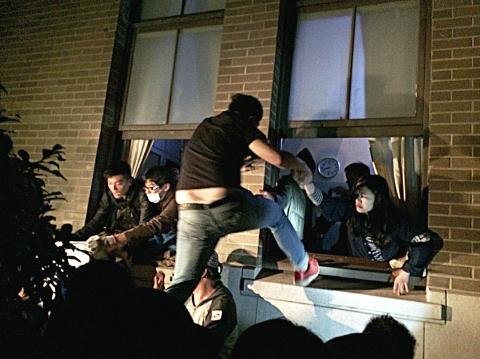
Photo: CNA
March 21
Ma called a meeting with Vice President Wu Den-yih (吳敦義), Jiang and Legislative Speaker Wang Jin-pyng (王金平) in a bid to end the confrontation, but it was canceled after Wang excused himself, saying in a letter that the nature of the dispute is different from one that would require the intervention of the head of state.
March 22
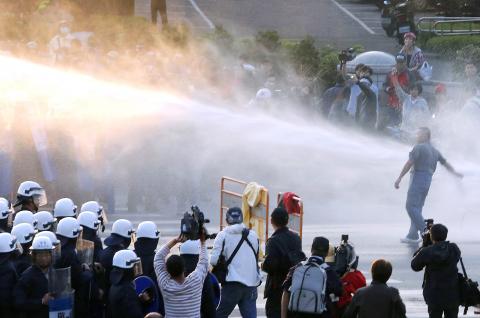
Photo: Reuters
Jiang became the first ranking administration official to see the protesters.
He was met outside the Legislative Yuan by National Taiwan University graduate student Lin Fei-fan (林飛帆) and other student leaders, who demanded that, for a dialogue to happen, the premier should promise first to withdraw the service trade pact from the legislature and to enact a new law aimed at providing close scrutiny of all agreements with China.
The brief encounter broke up after Jiang rejected the setting of preconditions for a dialogue.
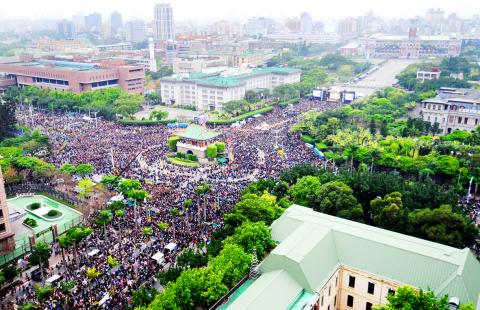
Photo: Lo Pei-der, Taipei Times
March 23
Ma called an international press conference, in which he stressed the importance of the cross-strait service trade agreement to Taiwan’s economy and its efforts to avoid marginalization. In response, the student-led movement said the president did not show any sincerity in having a dialogue with the protesters.
The students issued four demands: a civic conference on constitutional government, legalization of the mechanism for monitoring cross-strait agreements, no action on the service trade pact until the new oversight law is enacted and a pledge by all legislators to work on the new legislation first.
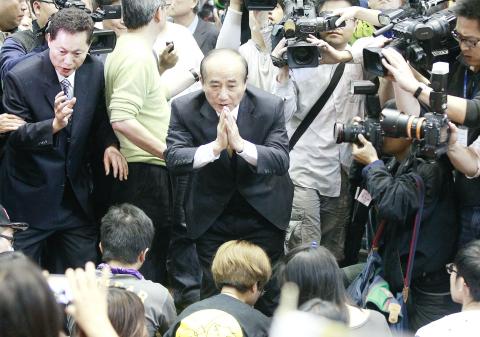
Photo: Pichi Chuang, Reuters
In the evening, hundreds of protesters broke into the Executive Yuan compound, which is about 200m from the Legislative Yuan.
As police prepared to evict the intruders, a few politicians of the Democratic Progressive Party (DPP) went to the site to support the activists. They included current and former party bosses Su Tseng-chang (蘇貞昌), Tsai Ing-wen (蔡英文) and Frank Hsieh (謝長廷).
After police reinforcements arrived, law enforcement began forcibly removing the activists after midnight, including the use of water cannons.
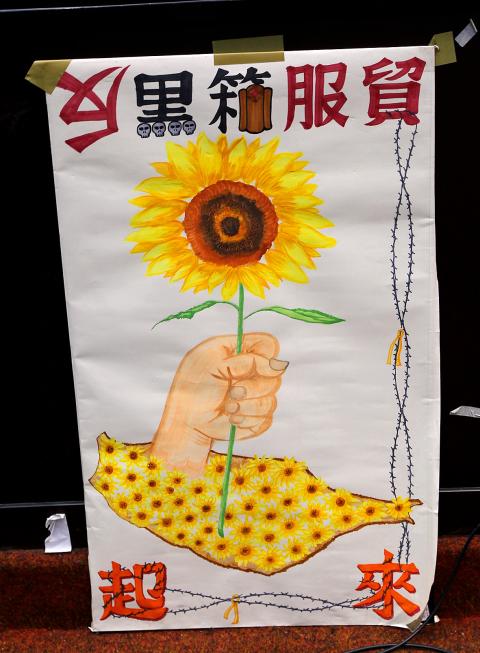
Photo: Chen Kuan-pei, Taipei Times
More than 200 people, including protesters and officers, were injured.
The compound was cleared of demonstrators by daybreak. Protesters alleged police brutality and “state violence.”
However, government officials said the police had exercised a high degree of self-restraint.
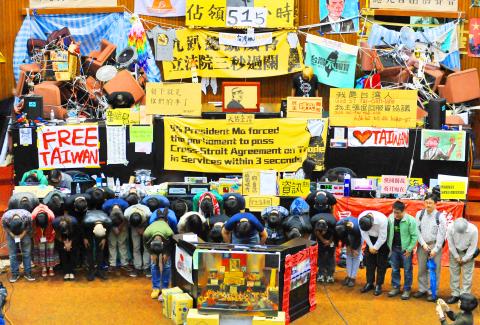
PHOTO: AFP
March 24
For the first time, Wang called on leaders of several legislative caucuses for consultations. Several more rounds of talks took place at his residence, but all broke down as senior lawmakers of the majority and opposition parties could not agree on how to handle the service trade pact.
The KMT caucus later agreed to have the pact returned to the committee stage for a detailed review, but no consensus could be reached in the consultations called by the speaker.
March 25
The president said through a spokesperson that he was willing to hold a dialogue with the students without any preconditions in order to resolve the dispute.
March 27
The student-led occupation movement called on the public to attend a rally in front of the Presidential Office Building set for March 30.
March 28
For the first time, the premier said the administration is open to the possibility of legalizing the mechanism for the oversight of all cross-strait agreements. At the same time, he rejected the students’ demand that the service trade agreement be withdrawn from the legislature.
March 29
The president held a second press conference to explain the administration’s position on the dispute.
March 30
A peaceful rally of demonstrators dressed in black took place on Ketagalan Boulevard in front of the Presidential Office Building. Organizers said as many as 500,000 took part in the event.
Police said the number was 116,000 at its peak.
March 31
KMT legislator Chang and Lin Hung-chih (林鴻池), chief whip of the KMT legislative caucus, apologized for the social turmoil following their action on March 17.
April 1
The China Unification Promotion Party, founded by former leader of the Bamboo Union gang “White Wolf” Chang An-le (張安樂), and some labor groups supportive of the service trade pact marched on the Legislative Yuan and demanded that the authorities take action against the student-led occupation of the legislative chamber. Once there, they confronted the protesters and some DPP politicians. Police struggled to separate the two opposing camps.
April 3
In a weekly meeting, the Executive Yuan approved a draft bill aimed at increasing the oversight of cross-strait agreements.
Protest leader Chen Wei-ting (陳為廷), a graduate student at National Tsing Hua University, rejected the text of the bill as “mere form.”
As many as 10 alternate versions of the proposed legislation were being discussed by the students.
April 6
Wang returned to the Legislative Yuan for the first time since March 18 after declaring that he would not call any cross-party caucus meetings on the service trade pact until the new oversight law has been enacted.
Once in the main chamber, he shook hands with Lin and urged all students to go home.
April 7
The student leaders said they would evacuate the legislative chamber at 6pm yesterday.
Source: CNA

DEFENSE: The National Security Bureau promised to expand communication and intelligence cooperation with global partners and enhance its strategic analytical skills China has not only increased military exercises and “gray zone” tactics against Taiwan this year, but also continues to recruit military personnel for espionage, the National Security Bureau (NSB) said yesterday in a report to the Legislative Yuan. The bureau submitted the report ahead of NSB Director-General Tsai Ming-yen’s (蔡明彥) appearance before the Foreign and National Defense Committee today. Last year, the Chinese People’s Liberation Army (PLA) conducted “Joint Sword-2024A and B” military exercises targeting Taiwan and carried out 40 combat readiness patrols, the bureau said. In addition, Chinese military aircraft entered Taiwan’s airspace 3,070 times last year, up about

A magnitude 4.3 earthquake struck eastern Taiwan's Hualien County at 8:31am today, according to the Central Weather Administration (CWA). The epicenter of the temblor was located in Hualien County, about 70.3 kilometers south southwest of Hualien County Hall, at a depth of 23.2km, according to the administration. There were no immediate reports of damage resulting from the quake. The earthquake's intensity, which gauges the actual effect of a temblor, was highest in Taitung County, where it measured 3 on Taiwan's 7-tier intensity scale. The quake also measured an intensity of 2 in Hualien and Nantou counties, the CWA said.

The Overseas Community Affairs Council (OCAC) yesterday announced a fundraising campaign to support survivors of the magnitude 7.7 earthquake that struck Myanmar on March 28, with two prayer events scheduled in Taipei and Taichung later this week. “While initial rescue operations have concluded [in Myanmar], many survivors are now facing increasingly difficult living conditions,” OCAC Minister Hsu Chia-ching (徐佳青) told a news conference in Taipei. The fundraising campaign, which runs through May 31, is focused on supporting the reconstruction of damaged overseas compatriot schools, assisting students from Myanmar in Taiwan, and providing essential items, such as drinking water, food and medical supplies,

Taiwan is stepping up plans to create self-sufficient supply chains for combat drones and increase foreign orders from the US to counter China’s numerical superiority, a defense official said on Saturday. Commenting on condition of anonymity, the official said the nation’s armed forces are in agreement with US Admiral Samuel Paparo’s assessment that Taiwan’s military must be prepared to turn the nation’s waters into a “hellscape” for the Chinese People’s Liberation Army (PLA). Paparo, the commander of the US Indo-Pacific Command, reiterated the concept during a Congressional hearing in Washington on Wednesday. He first coined the term in a security conference last